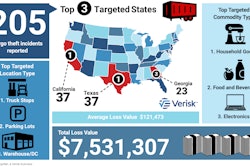BlueGrace Logistics, a third-party logistics company, has released its latest Confidence Index, which provides insight into how shippers feel about the health of the market heading into 2024.
Joining Jason and Matt this week on The 10-44 is Jason Lockard, BlueGrace Logistics’ senior vice president of managed logistics, who talks about the latest Confidence Index and what it could mean for motor carriers.
Contents of this video
00:00 10-44 intro
00:31 BlueGrace Logistics
03:09 Confidence Index
06:48 What it means for trucking fleets
08:02 When will markets flip?
09:28 Outlook for shippers and carriers
Jason Cannon:
This week's 10-44 is brought to you by Chevron Delo's 600 ADF ultra low ash diesel engine oil. It's time to kick some ash.
Matt Cole:
While the supply chain as a whole has rebounded post-COVID, challenges have persisted through 2023. What's the outlook heading into 2024?
Jason Cannon:
You're watching CCJ's 10-44, a weekly webisode that brings you the latest trucking industry news and updates from the editors of CCJ. Don't forget to subscribe and hit the bell for notifications so you'll never miss an installment of 10-44.
Hey everybody. Welcome back. I'm Jason Cannon and my co-host on the other side is Matt Cole. It's almost 2024, Happy early New Year and hang in there. We've almost made it to the end of 2023.
It's often considered that when rates are down for trucking companies, shippers are doing well. And while that can be the case for transportation costs, that's not necessarily the whole picture.
Matt Cole:
BlueGrace Logistics publishes a quarterly confidence index based on survey responses from shippers in their network that forecasts the upcoming quarter. Its latest release looking at Q1 for 2024 offers some insight into how shippers feel about the health of the market going into the new year.
Joining us this week is Jason Lockard, BlueGrace Logistics Senior Vice President of managed logistics, who talks about the latest confidence index and what it could mean for motor carriers.
Jason Lockard:
BlueGrace Logistics is a third-party logistics company based out of Tampa, Florida corporate office. Our business is kind of bifurcated around the managed logistics channel for BlueGrace. Obviously, that's a transportation management for clients that are looking for more business process outsourcing for us to manage, be a lot deeper into their supply chain and manage that logistics function for them. We're supported heavily by a best-in-class truckload brokerage, as well as many other shared services within BlueGrace that help complement that for us.
A lot of indices out there, obviously that have a sort of look in the past. We love data here. We love to share market insights with our clients, and what we were missing is sort of a good forecast and really nobody has a crystal ball, right? But we have something unique, which is a set of customers in those two different areas of the business that I mentioned before where we have a group of contract clients where we're managing multiple modes of transportation for them, whether we execute it or not, we still have visibility to the data. We have a relationship with those customers.
And then our brokerage side, much bigger labels on that side, Fortune 500-type companies. But the survey or index, Logistics Confidence Index, is a forecasting index, and that is taking the sentiment from those customers, looking at three primary metrics, revenue, inventory and order levels, and we picked those three as they were not directly tied to transportation. We didn't ask about shipments or modes, but more how they're going to be, what they forecast or foresee or project what their business is going to do in the upcoming quarter. So the data that we're going to look at here or that we're publishing is what our customer's opinion of Q1 '24 is going to be.
Jason Cannon:
BlueGrace's latest index shows shippers expect revenues to remain steady in the first quarter, while inventory levels and orders are expected to increase.
Jason Lockard:
Since 2023, coming into 2023, sort of end of '24, there was a lot of positivity. A lot of people thought that things were going to pick up and really get rolling and, obviously, that didn't quite happen. It was, let's call it, muted all year. And then we did have a pretty good retail spike here at Black Friday and let's call it a little bit of a rebuild on the backside of that for Christmas. So pretty decent consumer spending, maybe a slightly better than what a lot of people thought. And that was our forecast going in for the Logistic Confidence Index that we ran coming into Q4 seems like that played out.
And so what we're seeing for Q1 '24 is as it relates to revenues, there's just been a slight shift from, let's call it, folks that were neutral are maybe moving a little bit into the negative territory, which just means we're just going to be conservative with the inventory we have left. Maybe they sell through everything that they had, but there's a slight uptick on the positivity side, so there's going to be some folks that are rebuilding some of that stock. But for the most part, just kind of status quo, right? It's going to most likely be flat based on the results in this survey.
So on the next metric for inventory levels, that first one was revenue. The next metric on inventory levels is again, possibly we're a lot more positivity going from 45% to 51% positivity. And so more folks are looking to rebuild those stocks as they come into Q1. Things that were depleted in those warehouses looks like they're going to be rebuilding a lot of that.
And then the order levels, a much more positive view on that which, if revenue levels are going to be flat, inventory levels are going to be rebuilding, but order levels are going to be increasing, most likely there's going to be sales or reduction in price. We're not going to see what we saw in '21, '22 obviously, where things are just going skyrocketing and there's so much demand, there's not enough supply.
So the Fed's done what they've had to do interest rate-wise. Obviously inflation, the numbers are looking better, closer to where they want them to be. So it looks like that's sort of playing out with what we're seeing here as well.
Matt Cole:
After a word from 10-44 sponsor Chevron Lubricants, we'll hear from Jason on what this means for trucking fleets.
Jason Cannon:
Protecting your diesel engine and it's after-treatment system has traditionally been a double-edged sword. The same engine oil that is so essential to protecting your engine's internal parts is also responsible for 90% of the ash that is clogging up your DPF and upping your fuel and maintenance costs.
Outdated industry thinking still sees a trade-off between engine and emission system protection, and Chevron was tired of it, so they spent a decade of R&D developing a no-compromise formulation. Chevron Lubricants developed a new ultra low ash diesel engine oil that is specifically designed to combat DPF ash clogging. Delo 600 ADF with OmniMax technology cuts sulfate ash by a whopping 60%, which reduces the rate of DPF clogging and extends DPF service life by two and a half times. And just think what you can do with all the MPGs you're going to add from cutting your number of regions.
But Delo 600 ADF isn't just about after-treatment. It provides complete protection, extending drain intervals by preventing oil breakdown. Before you had to choose between protecting your engine or your after-treatment system, and now you don't. 600 ADF from Delo with OmniMax technology, it's time to kick some ash.
Jason Lockard:
Good is a relative term, right? So good for shippers, if you're pulling on the price thread, obviously it's a very good market for them to bring down the cost on that, although they're dealing with increased costs in pretty much every other area of their business. And so it's sort of helping where they can't control some of the other things in the supply chain that are really squeezing margins for them.
If good is service, then I think we're at this sort of equilibrium spot where the carriers that if we're referring the truckload or LTL, I think the carriers that have always hung their hat on, we're going to provide the best-in-class service, maybe not always the cheapest price. They're very well-positioned because their pricing practice is very disciplined and they're not taken on business that's going to hurt them in the long run and so I don't see that really changing very much.
If anything, where there's a lot of capacity, it looks like the spot rates are still kind of haven't found complete bottom yet, which is crazy. But for those value creation type carriers, I don't think there's really any impact. They're going to continue to provide a great service for their customers, and the customers are willing to pay a little bit more for that in exchange to service their clients.
Jason Cannon:
The big question everybody in trucking wants to know, but it's nearly impossible to answer, is when the market's going to flip back in the carrier's favor?
Jason Lockard:
Everyone's sort of pointing to late Q2, Q3, probably not going to happen in Q1-type environment so nothing... I would just say what we learned, to your point with what we had to experience post-COVID, I believe we're going to have a better indication that it's coming than what we did before because things got so upside down before in the early parts of '21 where there just simply wasn't enough product to sell. And so you have these companies that just missed out on all these opportunities to sell their product because the shelves were empty, they couldn't get the product that was delayed in transit, capacity was tight, couldn't find a truck, you had to overpay for it, all these things. And then that created a sort of knee-jerk reaction on the backside of that when things started to open up, people overbought inventory, continued to make bad decisions, and then they kind of got stuck with it after that.
And so I think we're back to a very disciplined supply chain management type of approach. And so when we do see the changes, the positive trends in the data, I think they're real. They're not going to be, is this actually going to happen? And so I think when we start seeing the trends moving in the right direction, there's probably a lot more consensus, like I was referring to before with our index or confidence that these leading indicators are actually real.
Matt Cole:
Based on feedback from BlueGrace's customers, the overall supply chain outlook for 2024 is pretty positive, both on the shipper and carrier side of the equation.
Jason Lockard:
You know, we're fortunate enough to have big retail customers in our portfolio and a lot of conversations with them, again, around discipline within the supply chain. We're still in a mode of we don't want to bring in inventory faster than we really have to have it on the shelf. We also don't want empty shelves and so it's creating this balance.
So I see that continuing to happen, although we're also having conversations and talking about their future projections for business, and almost all of those are pretty positive. They all think they're going to grow next year in terms of sales. And there's even, from talking to our carrier partners as well, there's still a lot of talk about opening up new facilities and bringing on more equipment. And so pretty consistently, and not just one carrier, multiple carriers are all kind of saying the same thing. And some of that is replacing old equipment, but those are all still very positive signs that say we're going to eventually get back to a better environment here, and not too worried about it.
Jason Cannon:
That's it for this week's 10-44. You can read more on ccjdigital.com. While you're there, sign up for our newsletter and stay up-to-date on the latest in trucking industry news and trends.
If you have any questions or feedback, please let us know in the comments below. Don't forget to subscribe and hit the bell for notifications so you can catch us again next week.











